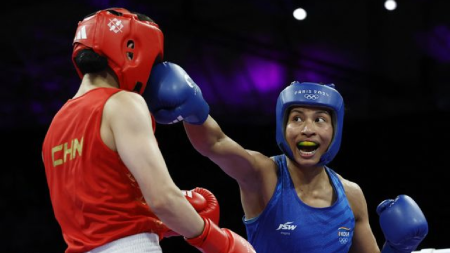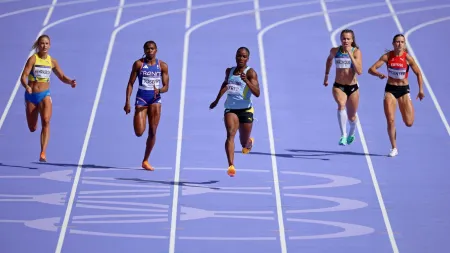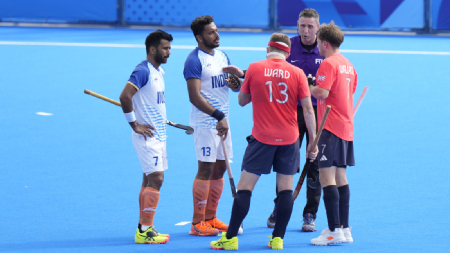How over-thinking in first set and over-passiveness in second set made Lakshya Sen slip-up against Viktor Axelsen in a match for ages
A lifetime of dedication aside, Lakshya Sen had poured his heart and skill into an exquisite cross court smash, glorious in its placement and power, to put the legendary Viktor Axelsen on the ropes in the Olympic semifinal. Paris had paused to admire the rise of the princeling, the stumble of the King.
From leading 17-11, Sen had allowed the Danish defending champion a re-entry into the first set while still leading 19-17, but that aggressive air-scything smash with a turned racquet-face had been perfection and put him on the verge of a statement making opener at 20-17. There was the buzz of a grand upset in the air, when the tables turned in a matter of seconds and the reverse of alchemy unfolded as Sen’s gold-ambition got downgraded to a bronze.

Perfection turned into a proper plummet when a nervy Sen sent off a horrid serve to make it 20-18. Axelsen went on to win the match 22-20, 21-14 in 53 minutes, after Sen had wowed the world, and troubled his opponent for large parts, and did everything right, except winning the finish.
Those critical moments when Sen could not close out a 20-17 lead are best described by the great Dane who superbly hijacked his Indian dream. Axelsen was asked specifically what he was thinking, staring at a 17-20 scoreline. “At 17, I tried not to think,” he said plainly. “Because if you start to think, then you’ll have problems. I think Lakshya thought a lot about it,” he clinically diagnosed his opponent’s sudden plunge, as he first sent two returns long to allow Axelsen to level at 20-20. The Dane earned those errors on the back of massive clutch defense as Sen put him under the pump.
And then, the 30-year-old who’s assured of his third Olympic medal making him an all-time great, pulled off the unlikeliest of tricks. He began swivelling his serve stance, taking over 6-7 seconds rather than the quick, routine throw-in, delaying the start of the rally just a little, and that boggled the Indian who moments before had reckoned he had the set in his pocket. The two dawdle serves shook Sen’s composure so much, he dumped a return into the net to give away the first set 22-20. It was the most disarming of triggers.
View this post on Instagram
A post shared by Viktor Axelsen (@viktoraxelsen)
For a country that’s never had a male player in the Olympic semifinals, this was a big moment. For a shuttler who’s spent all his life since age 8, wanting to live this moment where he could potentially be halfway into an Olympic final, those closing-out seconds were nerve shredders. The gray-eyes of Axelsen had glinted at the realisation.
“It was a big thing for Lakshya obviously. I know what the occasion does, you start to think I have momentum, I have a big chance. But again it’s so natural to think like that,” he said later scribbling Sen’s possible thought bubbles. “I’ve been there myself. He got a little bit nervous. And when you (opponent) get nervous, I know I have to strike and I have to keep shuttle in court, and then play right shots because maybe he will make mistakes because of nerves. And that’s what happened.
Sen had the watching world’s attention on him. He was on the brink of the audaciously improbable. But he couldn’t summon elite ruthlessness. “The 17 serve miss didn’t rankle, not really,” he insisted. “But I was a bit nervous in the end. From 20-20, the next two points, I made easy mistakes from my side,” he said.
Till that moment, he had Axelsen dancing to his tunes. His crosscourt smashes were zooming across the Dane, and his backline clears and lifts were dropping pin-point. At 11-10 his cross caught a crescent of the sideline, and at 18-13, Sen’s overhead deception sent a vicious down the line that had completely wrong-footed Axelsen, as he dictated rallies in the first set. The Dane had been sailing wide and long trying to avoid Sen’s retrieves, and for the first time this Olympics, someone was not in the least intimidated by the big Axelsen smash. Forced to dig deep, the World No 2, put in the defensive workrate clambering back to 19-17, from where he did his little serve variation, his sudden flick serves ruining Sen’s momentum.
All along, Axelsen had also been trying to exploit Sen’s forehand lateral reach. Because he can’t impart a whip to that shuttle that comes at ear-level, Sen can be pinned there, forced to linger and contrive a limp return, before attacking his backhand side. Axelsen kept at the tactic through the second.
Sen took a 7-0 lead in the second. But the lost opportunity of the opening set seemed to make him pull his punches. “Losing 3 game points was not really playing on my mind. I got a good start in the second. I was just trying to play the same game. He changed a little bit and I was very very passive after having a good lead. In the second set especially after a good lead maybe if I had attacked a bit more… After he got back into the game it was difficult for me,” he said, as Axelsen smashes rained all around him and he was a goner.
Sen led 11-10, and was pulled 14-21 in a few minutes thereafter. Just like that. The moment had passed him by. “Tomorrow I have everything to play for,” he said later of the semifinal against Malaysian Lee Zii Jia.
Olympics 2024- Manu Bhaker reaches final, targets her third Olympic medal today
- Paris Olympics: Shooting delivers third medal for India as Swapnil Kusale strikes bronze
- Coach Jaspal Rana details how life-work balance helped Manu Bhaker win two Olympic medals
While acknowledging he was pushed hard, Axelsen lauded the fight calling Sen a 2028 LA sure-shot gold contender. “Experience made a difference today. Lakshya played better than I did in big parts of the game. He could’ve won the match. But I won the match here today,” he said.
Being a gold medal contender and a certified legend entails suspension of active-thinking at the most crucial juncture, and allowing instincts, muscle memory and experience to take over. Sen thought he had the first set, when he ought not to have been thinking at all.
Disclaimer: The copyright of this article belongs to the original author. Reposting this article is solely for the purpose of information dissemination and does not constitute any investment advice. If there is any infringement, please contact us immediately. We will make corrections or deletions as necessary. Thank you.





